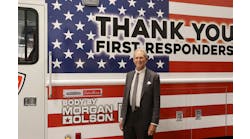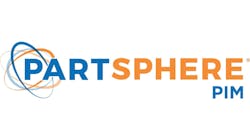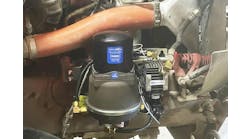Together for Safer Roads (TSR)—which builds cross-sector partnerships intended to improve transportation safety around the world—recently launched the “Fleet Trucking Global Safety Standards” initiative, a global undertaking aimed at developing a shared standard with the potential to save “thousands of lives.”
The initiative launched before the 7th Annual UN Global Road Safety Week last month.
“Together for Safer Roads applauds the United Nations and World Health Organization’s efforts to promote road safety and their goal to reduce road deaths and injuries by half of their current rates by 2030—and eventually reach ‘Vision Zero,’ the elimination of all traffic fatalities and severe injuries,” Peter Goldwasser, TSR executive director, said in a news release.
“In line with these goals, TSR is launching this exciting new initiative to establish industry standards for fundamental safety instruments, which will ultimately result in a comprehensive suite of recommended standards for a broad cross-section of critical safety instruments and technologies. These will include telematics, pedestrian detection systems, automatic braking, airbags, side curtain airbags, side view mirrors, seatbelts, and others. We know from fleet trucking experts that there are no universally shared industry standards for these safety instruments. Our goal is to change that.”
Added Andres Peñate, TSR board chair, and global VP of corporate affairs at Anheuser-Busch InBev: “Together for Safer Roads is proud to stand with the UN road safety collaboration, and all our fellow road safety advocates in this decade of action for safer roads. We look forward to presenting our new global safety standards concepts to this body in the future, and to ongoing work with the governments of UN member states as we work toward Vision Zero.”
Cormac Gilligan, TSR board member, and global head of environment, health and safety at UPS, said embracing universal safety-based technology requirements will lead to the more equitable deployment of safer trucks, in secondary resale markets and beyond. “They will have the chance to purchase trucks that meet the standards of the largest global fleet operators without prohibitively expensive retrofitting costs,” he maintained.
TSR has a longstanding commitment to this work. For example, after implementing TSR’s recommended Vision Zero strategies, the state of São Paulo experienced a 13% reduction in road fatalities across 64 towns and cities, and Shanghai municipality saw an astounding 90% reduction in intervening road fatalities, the organization reported. TSR recently launched a Truck of the Future pilot program with vehicles from the City of New York that identifies and tests innovative and cost-effective solutions to eliminate collisions between large vehicle operators and vulnerable road users. The pilot will expand internationally later this year, working with a private-sector fleet in Mexico City.
“The new Fleet Trucking Global Safety Standards initiative aligns directly with the UN’s Vision Zero goals, and should be supported by fleet truck operators around the world,” said Richard Kent, TSR board member, and president of global sales at VisionTrack. “We invite businesses, governments, and organizations around the world to join us in this important work.”









